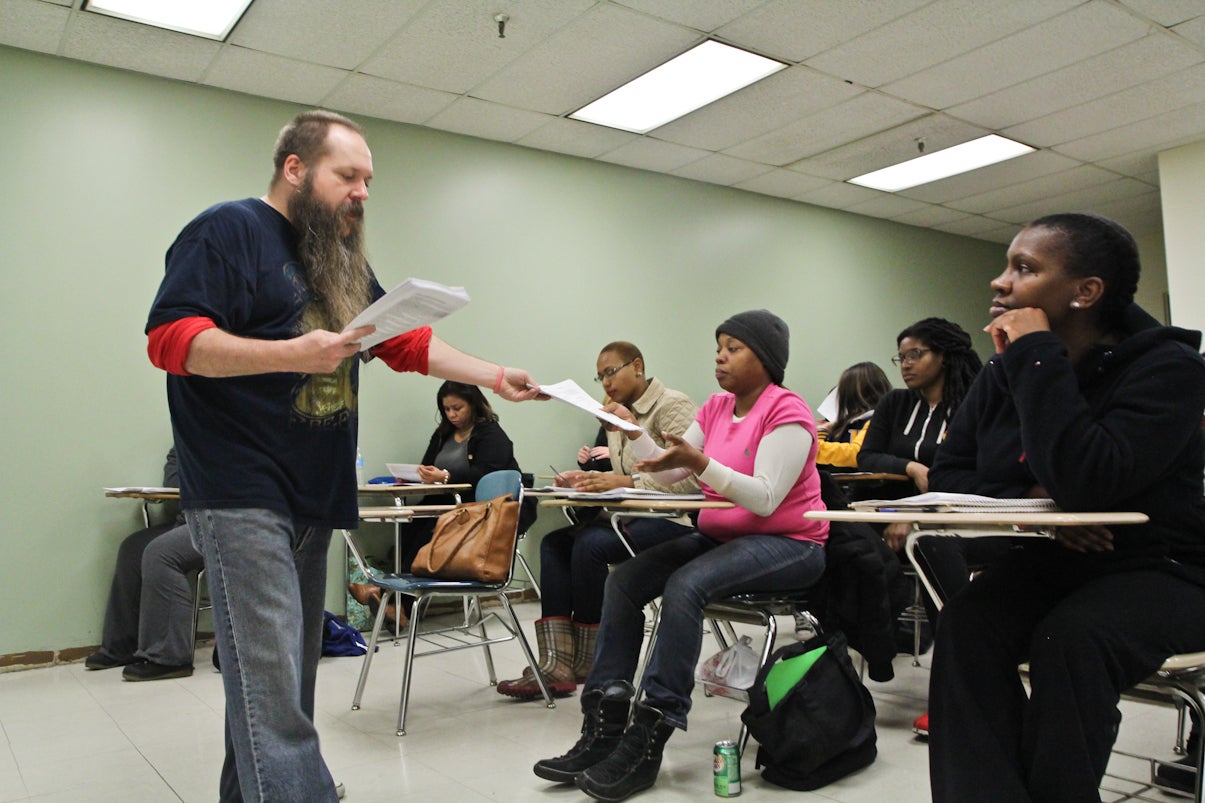Years of surveys offer insights on Philly’s ‘no-snitching’ mindset
Listen
Dr. Rick Frei, associate professor of psychology at Community College of Philadelphia, hands out sample surveys to students who will collect data on attitudes toward snitching. (Kimberly Paynter/WHYY)
Witness intimidation in Philadelphia takes many forms. People have been harassed in courtrooms, threatened through social media and shot in the streets. A house full of children was even firebombed.
For the last few years, a psychology professor at the Community College of Philadelphia has been studying the city’s “no-snitching” attitude — and he has found that it may be easier to convince people to cooperate with police than you think.
Rick Frei started researching “snitching” almost by accident. Back in 2007, as he does ever year, he taught students in his applied psychology class how to carry out a survey. The subject that time was why some people cooperate with police and others refuse.
“It was just a topic that the students found interesting,” he said. “Students are much more involved in research if it’s a topic they find some interest in.”
That first group surveyed about 1,500 classmates and found a potential root cause of some residents’ “no-snitching” attitude. Almost one-third of respondents said they would be less likely to cooperate with police if it hurt their reputation in the neighborhood.
“Very often, they had to rely on their neighbors for their well-being, and not on police who may take a little longer to get to certain neighborhoods,” Frei said of the respondents. “So the idea was that if you did things that damaged your reputation in your neighborhood by cooperating with police, that may come back to haunt you later.”
As part of what is now known as “The Snitching Project,” Frei’s students have conducted six surveys of more than 5,000 people. They’ve discovered that, above all, the “no-snitching” attitude is complicated. For instance, survey respondents are more likely to cooperate with authorities if the victim of a crime is a child, senior citizen or disabled person. They’re less likely to talk, though, if police are investigating a friend or relative.
Eventually, Frei started wondering: Could the “no-snitching” attitude be doing more than hindering prosecutions? Could it be hurting Philadelphians’ job prospects? Many employers ask applicants to take “integrity” tests that try to predict if they’ll do the right thing — and that means reporting any wrongdoing.
In 2011, Frei’s students put a question to 900 people, including students from the Community College of Philadelphia: “You witness a nurse stealing drugs from one of her patients at a hospital. What do you do?”
“Even with people who said they were going to be nursing majors, a full third of people said that, ‘I would do nothing,'” said Frei. “So I’m a little concerned that maybe our students with a non-snitch mentality are going into the workplace, and finding themselves having a harder time finding jobs.”
In a later survey, Frei found that respondents are more likely to cooperate if they’ve had a positive experience with police in the past. That might sound obvious, but what’s surprising is that a “positive experience” could be as simple as a cop helping them with directions or car troubles.
Frei has shown this research to Police Commissioner Charles Ramsey. “We know it’s getting out to the people that need to hear it,” Frei said. “Whether they’re going to use that information, that’s up to them.”
Encouraging connections in the community
However, it appears that police are not utilizing it. Kevin Bethel, a deputy commissioner in the Philadelphia Police Department, said he hasn’t read Frei’s findings, but he knows the topic all too well.
“I have a mother-in-law who I love dearly,” he said, “who lives in the heart of North Philadelphia, and she, even with me sitting in this position [as] deputy commissioner, does not feel safe enough to walk out the door and say, ‘He did it.'”
However, Bethel said, most citizens are willing to cooperate with police. He said the police department has worked hard in recent years to chip away at the “no-snitching” attitude, pushing officers to attend community meetings and, well, be more friendly.
“Most people can tell you on the count of their hands the number of times they have an encounter with a police officer,” he said. “And what we try to stress to our officers is that is a very critical moment when they can build a bridge, or they can tear down that bridge forever.”
So Frei may not be revolutionizing public policy just yet. But, according to former student Pete Kaffenberger, he’s at least clinched his original goal of getting young people excited about psychology.
“You just see how passionate he is about everything that he does,” said Kaffenberger, “and it’s infectious.”
WHYY is your source for fact-based, in-depth journalism and information. As a nonprofit organization, we rely on financial support from readers like you. Please give today.

